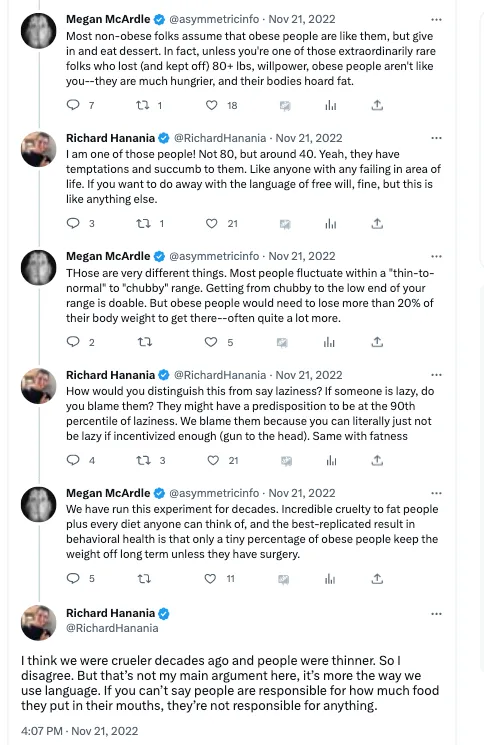From Richard Hanania: Fat Shaming and Free Will: How to think about the concept of “choice”.
It’s inconsistent how people who are otherwise empirically-minded in so far as IQ, the futility of pre-k (and other costly education intervention), or crime stats are concerned, but cannot bring themselves to accepting the data that most dieters fail (between 80-95% depending on the study).
Its like, “What do you mean by fail? Or most?” It’s similar to ‘progressives’ and IQ: “What do you mean by intelligence? I know someone who has an IQ of 140 and is unemployed, ipso facto, IQ is not real.” I dunno, man, it means what the data says it means–the same data you otherwise assume is correct about crime stats or IQ. Scientists tracked a bunch of people who went on a diet and despite some initial progress, most eventually regained a lot, if not all, of the weight they lost. Although one should not blindly trust data, this is one of those finding that has held up repeatedly. [1] Although some people do lose significant weight long-term with diets.
As someone who lost a lot of weight and now has a normal BMI, maintaining it requires attentiveness and effort (e.g. keeping the calories under a certain threshold, suppressing the nagging feeling of being hungry, checking labels, etc.). I can definitely see how a lot of people would fail if they are not assiduous about it.
He writes:
As a teen, at some point, I decided to start making a spreadsheet and counting my calories. Shockingly, there was a very strong correlation between how much I ate and how much I weighed, and I soon got in shape. Over the course of my adult life, my weight has fluctuated in ways that are easily explainable by life circumstances. When I started my PhD studies at UCLA, I got thin as people tend to do when placed in new environments where they need to form new relationships. As I got comfortable in my routine and where I was socially, I put on weight. I was then fat for a while, eventually becoming skinny again after I saw how bloated I looked on TV. This all feels very much like a choice to me, as much as anything else in my life does.
How does this prove his point? He’s describing what yo-yo dieting is. All it shows is that people can temporarily lose some weight through willpower and diet, but for whatever reason they regain it. People who are biologically predisposed to thinness may also have similar fluctuations, but with lower highs and lower lows.
If your weight is the product of how much you eat and exercise, and these behaviors respond to incentives, then shaming has a role to play in nudging people towards better choices.
This sounds like goalpost moving or a gross oversimplification of the problem. A choice is like choosing to watch Survivor or Dancing with the Stars. Turning an obese person into a normal weight person will take more than just choices. Replacing pizza with lean meat is a good start, but obese people tend to eat too much regardless of what is eaten, so replacing one food with another food does not change the overeating, cravings for junk food, or the ‘always feeling hungry’ problem.
In the tweet exchange, Megan McArdle is right. Even if you think her views on economics are too laissez-faire, she is correct that the stats on diets are dismal.

The shaming aspect of his argument is also weak, for several reasons: fat and thin people alike are generally exposed to more pro-thinness/fitness messages than pro-fatness messages. It’s not like we need a national advertising campaign to promote the dangers of obesity when the media talks about it constantly. Also, the fact that the health and fitness industry is so big is an implicit admission of such awareness: overweight people want to lose weight and know obesity is bad, or else there would not be such huge demand for drugs (notably glp-1 drugs) and advice, such as the popularity of fitness/health influencers online. So shaming is just another level of redundancy. This is why markets are so useful: they tell us what people want and their preferences.
What about the decline of smoking? Doesn’t this prove shaming works? But these are different things. Smoking declined because teens stopped taking up the habit–you cannot get addicted if you do not start. So all that is mostly left are old, dying smokers. Cigarettes are optional, but how does avoid food?
[1] Maintenance of lost weight and long-term management of obesity
Substantial weight loss is possible across a range of treatment modalities, but long-term sustenance of lost weight is much more challenging, and weight regain is typical1–3. In a meta-analysis of 29 long-term weight loss studies, more than half of the lost weight was regained within two years, and by five years more than 80% of lost weight was regained (Figure 1)4. Indeed, previous failed attempts at achieving durable weight loss may have contributed to the recent decrease in the percentage of people with obesity who are trying to lose weight5 and many now believe that weight loss is a futile endeavor6.
You flew by your most important point- “ you cannot get addicted if you do not start”. Parents should be shamed so they don’t take their children to McDonald’s, etc. giving them processed food all day rather than vegetables/fish matters.